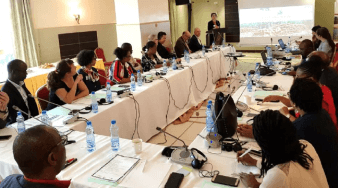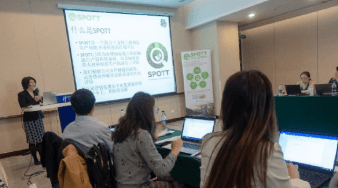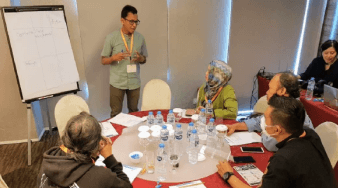Illegal logging is a major driver of tropical forest degradation, leading to biodiversity loss. Strengthening the legality of tropical timber production and trade is key to increasing the sustainability of timber production. The European Union’s FLEGT – Forest Law Enforcement, Governance and Trade – Action Plan supports timber-producing countries in reforming their forestry sectors to improve legality through Voluntary Partnership Agreements (VPAs).
The 2019 expansion of SPOTT, supported by UK Aid, focuses on companies in countries at various stages of the VPA development process that have exceptional biodiversity – Indonesia, Cameroon, the Republic of Congo and Gabon – and traders in China that increasingly source timber from Africa.
To explore the challenges, opportunities and benefits of improved transparency, and its role in promoting greater sustainability in the sector, SPOTT brought together companies, government representatives, industry bodies and NGOs in a series of in-country workshops.
The 2019 Forestry Transparency Forums were developed to help SPOTT engage with forestry sector stakeholders and promote constructive dialogue. In total, 144 participants attended the Forums, held in Jakarta, Douala, Brazzaville, Libreville, and Beijing during February and March. Attendees were able to meet the SPOTT team and increase their understanding of SPOTT’s approach, processes and users, while the SPOTT team had the opportunity to hear stakeholders’ feedback and concerns, helping them to improve the SPOTT initiative.
Stakeholders took part in presentations and discussions about the issues associated with low levels of transparency in the forestry sector. Participants also identified the obstacles to increasing transparency and discussed potential actions to overcome them. Within this context, the evolution of legal frameworks, the development of VPAs, and role of certification were also broadly discussed.
Against the backdrop of growing demand for more sustainable products, Forum stakeholders discussed the advantages of greater transparency, recognising that improving the reputation of the sector could lead to increased business opportunities and market access. Participants also identified a range of obstacles to greater transparency that would need to be overcome by increasing capacity, enabling multi-stakeholder dialogue and cross-sector collaborations, and strengthening the business case for transparency
A further series of Forestry Transparency Forums will be organised in the same countries in 2020 to build on the 2019 Forums, take stock of progress made by stakeholders, and explore the efforts and support still needed for increased sustainability and legality in the tropical forestry sector.
Full reports from the Forums are available to download below.



